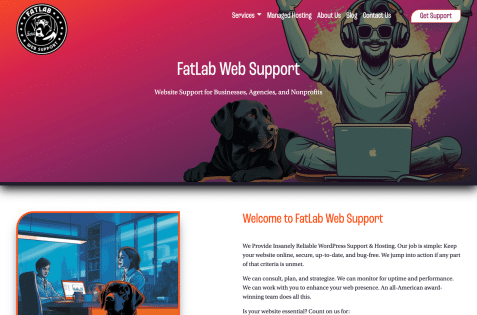Importance and Potential of Custom WordPress Development
Custom WordPress Development opens up possibilities for businesses and individuals alike. It allows for creating unique, tailored websites that stand out from the crowd and truly represent the brand they’re built for.
Custom development transcends the limitations of pre-designed themes or templates, offering greater flexibility and control over the site’s design, site functionality, and performance.
It paves the way for robust and dynamic websites that evolve with changing business needs and user trends, significantly enhancing their longevity and effectiveness.
Moreover, custom WordPress development enables businesses to leverage the cutting-edge capabilities of WordPress. It allows for a wide range of innovative features and integrations that can help take their websites to the next level.
The Rise of Custom WordPress Development

Evolution of WordPress

WordPress has come a long way since its inception in 2003. Originating as a simple blogging platform, it has evolved into a comprehensive Content Management System (CMS) that powers approximately 40% of all websites.
This transformation didn’t happen overnight. It resulted from continuous improvements, feature additions, and an unwavering commitment to user-friendliness.
Over the years, WordPress has expanded its functionality beyond blogging, enabling the creation of complex websites, e-commerce platforms, and even mobile applications.
The advent of the Gutenberg editor in 2018 marked a significant milestone in WordPress’s evolution, introducing a block-based editing environment that further simplified the user experience.
A thriving community of web developers and contributors, along with an ever-growing library of plugins and customizable themes, continues pushing the boundaries of what WordPress can do, making it a versatile platform for all web development projects.
Increasing Need for Tailored Web Experiences and the Role of Custom Development

In the era of digital ubiquity, audiences are inundated with a plethora of websites, leading to an increasing demand for unique, tailored web experiences.
A website reflects a brand’s identity; thus, a standard, one-size-fits-all solution often falls short of effectively conveying the distinct essence of the brand.
Custom WordPress Development plays a pivotal role in this regard, enabling the creation of websites that resonate with the brand’s ethos and meet the specific needs of its target audience.
Custom development facilitates the implementation of unique features and functionalities that elevate user experience, promoting engagement and retention.
It enables the integration of third-party applications and services, providing seamless experiences to users and enhancing the website’s utility.
Furthermore, it allows for advanced SEO and performance optimization, ensuring the website’s visibility and speed are optimized.
In a competitive digital landscape where user experience forms the crux of a website’s success, the role of custom WordPress development as a catalyst for creating tailored web experiences is crucial.
The Power of Custom WordPress Themes

Custom WordPress themes wield immense power in shaping a website’s aesthetic and functional aspects.
Unlike pre-designed themes, where the scope for customization options is often restricted, custom themes offer unparalleled freedom to tailor every site element according to the brand’s requirements.
All design elements- from the color palette and typography to layout and navigation – can be crafted to mirror the brand’s identity, resulting in a site that looks distinct and feels inherently connected to the brand.
Beyond aesthetics, custom themes also empower developers to build specialized functionalities on the site. Integrating custom post types, fields, and taxonomies, or developing personalized plugins, becomes feasible with custom themes, enhancing the site’s utility.
Custom themes are typically less bloated than their pre-designed counterparts, leading to faster loading times and better overall site performance.
They also provide greater control over SEO elements, which can significantly boost the site’s ranking on search engines.
Thus, the power of custom WordPress themes lies in their ability to offer a seamless blend of aesthetics, functionality, and performance, all tailored to the brand’s vision. This makes them invaluable in seeking a truly unique and effective digital presence.
Crafting Your Custom WordPress Themes

Creating your WordPress theme can be rewarding, as it allows you to put a personal touch on your website, tailoring it to your brand’s specific needs and style.
The Technical Aspects
It begins with understanding the basics of WordPress theme structure, involving a set of PHP theme files like `index.php,` `header.php,` `footer.php,` and `style.css,` among others. These template files function collectively to display your website’s content and layout.
Web Design
Once you grasp the WordPress theme structure, the design process commences, starting with wireframing and moving on to designing the layout using graphic design tools.
Technical Knowledge & Programming
This is followed by converting the design into your custom WordPress theme using HTML, CSS, JavaScript, and PHP. It’s important to adhere to WordPress coding standards and best practices during this phase to ensure the theme is secure and performs well.
The process continues with adding functionalities and features to your WordPress theme. This could involve creating custom post and template file types and taxonomies, integrating plugins, establishing navigation menus, or building template tags.
Customizing the WordPress loop to display content in a specific manner is another crucial part of the process.
Browser Compatibility, Speed & SEO
Finally, testing your theme across different browsers and devices, optimizing it for speed and SEO, and ensuring its compatibility with the latest WordPress version are critical steps before launching your custom theme.
In conclusion, crafting a custom WordPress theme requires a blend of creativity, technical proficiency, and a keen understanding of your brand’s identity.
Though it may seem daunting, its control and uniqueness make it an avenue worth exploring in your journey toward establishing a strong and distinct digital presence.
Beyond Aesthetics – The World of WordPress Plugins

WordPress plugins open up vast possibilities, extending functionality beyond aesthetics and fundamentally altering the capabilities of a WordPress website. An extensive selection of free and premium plugins exists but may not fulfill 100% of your business website needs.
They are essentially PHP scripts that add new features or extend existing ones within WordPress websites, empowering you to customize your entire site to suit your business requirements without touching a single line of code.
From e-commerce solutions and SEO enhancers to social media integrations and security hardening, there is a plugin for virtually every functionality you can imagine.
For instance, WooCommerce transforms your website into a full-fledged online store, while Yoast SEO helps optimize your site for search engines. On the other hand, plugins like Akismet are designed to keep your site secure by preventing spam comments and contact form submissions.
Moreover, the ease of installation and the vast array of free and premium options make WordPress plugins an essential tool in the toolbox of any WordPress user.
However, choosing plugins wisely is crucial, considering factors such as the developer’s reputation, compatibility with your WordPress version, frequency of updates, and user ratings and reviews.
In essence, WordPress plugins go beyond aesthetics, enabling you to customize your website’s functionality to suit your specific needs, enhancing user experience, and contributing to your online presence’s overall success.
Importance of Custom Plugins in Extending Unique Functionalities

Custom plugins are pivotal in extending unique functionalities and personalizing your WordPress website to meet specific requirements. Unlike generic plugins available in the WordPress repository, custom plugins are developed from scratch to serve bespoke functions that may not be achievable with off-the-shelf solutions.
Custom plugins offer unmatched flexibility. They can be designed to perform complex tasks, such as integrating third-party APIs, implementing custom post types, or automating specific actions based on predefined triggers. This way, they can significantly enhance the site’s functionality and efficiency while maintaining a clean, streamlined codebase.
Custom plugins pave the way for superior performance and security. They are leaner since they contain only the necessary code to perform their intended functions, resulting in less load on your website and, consequently, faster load times.
These plugins are often less vulnerable to attacks on the security front as they minimize the possibility of exploiting common vulnerabilities often found in popular plugins.
While pre-made plugins can cater to a wide array of standard functionalities, custom plugins are key to unlocking unique and complex features. They can elevate your website from a standard offering to an optimized, efficient, and uniquely branded platform, enabling you to stand out in the digital landscape.
The Role of Custom Plugins in Personalizing Your Website
Custom plugins play a defining role in personalizing your WordPress website, allowing you to tailor every aspect of your site’s functionality to match your brand’s unique needs. They provide an opportunity to innovate, allowing you to add features not available in pre-existing plugins, thereby bridging gaps in functionality.
Personalization with custom plugins can range from minor tweaks to existing functionality to introducing entirely new features. For instance, a custom plugin could be developed to enhance your site’s user interface, add specific functionalities to your product pages, or even create an entirely new user interaction mechanism.
Furthermore, custom plugins seamlessly integrate your existing website theme and other plugins built specifically for your website’s configuration. This reduces the risk of conflicts or malfunctions, ensuring smooth operation and a consistent user experience.
Custom plugins are a powerful tool for carving your website into a unique digital space that resonates with your brand’s identity while delivering a seamless and engaging user experience. By investing in custom plugins, you can move beyond the constraints of off-the-shelf solutions and truly personalize your website to meet your specific objectives.
Advanced Customizations: Integrations & More

Advanced customizations in WordPress encompass various aspects, from integrating third-party services to creating custom workflows.
Integrations, in particular, offer a powerful mechanism for enhancing your website’s capabilities and efficiency. They connect your website with external services or platforms, such as social media channels, email marketing software, CRM systems, payment gateways, and more.
A well-executed integration allows you to streamline processes, automate tasks, and extend your site’s functionality. For example, integrating your website with an email marketing platform like MailChimp can automate email list management and campaign execution, thus saving time and ensuring a consistent communication flow with your audience.
Apart from integrations, advanced customizations can also include the development of custom workflows. Custom workflows can automate actions based on specific triggers, increasing your site’s efficiency. For instance, a custom workflow could automatically publish a blog post at a certain time of day, change the status of an order once it’s shipped, or send an email when a new user registers.
In essence, advanced customizations offer the potential to supercharge your WordPress website, making it more efficient, effective, and aligned with your specific operational needs. They are a testament to the flexibility and extensibility of WordPress, demonstrating how it can be tailored to meet virtually any requirement, regardless of complexity.
Custom Development Opportunities:

Personalized User Dashboards
Based on the user’s role (subscriber, editor, customer, etc.), display customized dashboard content such as recent purchases, article drafts, or personalized recommendations.
Dynamic Pricing Models
If it’s an e-commerce site, offer dynamic pricing or discounts based on user behavior, location, or purchase history.
Customized Reporting
Integrate analytics directly into the WordPress dashboard tailored to the company’s KPIs.
Integrated Booking Systems
Businesses in hospitality or services offer a booking system that syncs with other platforms or tools they use. Language and Localization Features
Automatic translations or region-specific content delivery based on user location.
Member Areas and Subscription Content
Provide restricted content areas for members or paid subscribers, including articles, videos, or special resources.
Custom Search Enhancements
Develop a more advanced search function with filters specific to the company’s content or products, utilizing AI for better content recommendations.
Integrated Customer Support
Embed live chat, ticket systems, or chatbots to provide real-time support.
Dynamic Landing Pages
Create landing pages that change content, CTAs, or even page layouts based on where the user comes from (e.g., social media, email campaigns, PPC ads).
Interactive Product Showcases
For e-commerce, offer 360-degree product views, AR try-ons, or interactive product customization options.
Custom Post Types for Testimonials or Case Studies
Allow easy addition of testimonials, reviews, or case studies that can be showcased on the website.
Integrated Learning Management System (LMS)
For educational companies or those offering courses, integrating an LMS directly into WordPress can provide users with courses, quizzes, and progress tracking.
Personalized Marketing Features
Utilize AI to display personalized product recommendations, content, or advertisements based on user behavior and preferences.
Feedback and Survey Tools
Embed custom forms, surveys, or feedback mechanisms to collect valuable user information directly.
Social Media Integrations
Automatically share new content to social platforms, showcase social media feeds on the site, or allow for content to be easily shared by visitors.
Tailored Mobile Experience
Develop custom mobile layouts or app-like features for mobile devices and users to enhance their browsing experience.
Accessibility Enhancements
For businesses focused on inclusivity, custom features to enhance website accessibility for those with disabilities can be essential.
Affiliate or Multi-vendor Platforms
Allow other vendors to sell on your platform or track affiliates and commissions directly from the WordPress backend.
Customized Invoicing or Billing Integrations
Tailor the invoicing and billing process to integrate with the company’s existing financial software or requirements.
Event Management and Calendar Tools
An integrated event management system can be invaluable for businesses that host events, webinars, or classes.
Connecting Your WordPress Site to CRMs, E-Commerce Platforms, or Social Media Platforms

Connecting your WordPress website and external platforms like Customer Relationship Management (CRM) systems, e-commerce platforms, or social media networks can greatly optimize your online operations and enhance user engagement.
CRM Integrations
CRM integrations allow efficient customer data management and enhance the customer’s journey by automating personalized engagements. WordPress can be integrated with popular CRMs such as Salesforce, HubSpot, or Zoho, creating a seamless data flow between the website and the CRM and improving tracking, targeting, and customer service.
E-Commerce Integrations
In the realm of e-commerce, WordPress can be integrated with platforms like WooCommerce, Shopify, or BigCommerce. These integrations facilitate the creation of robust online stores, complete with inventory management, secure payment gateways, and a variety of shipping options. This provides an enhanced shopping experience for your customers directly from your WordPress site.
Social Media Integrations
As for social media, integrating your WordPress site with platforms like Facebook, Twitter, or Instagram can boost your online presence and audience engagement. This could be as simple as adding social sharing buttons or more complex functionalities like auto-posting to social media or embedding a live social media feed onto your site.
Conducting these integrations involves using specific plugins or custom coding, depending on the complexity of the task and the particular functionalities desired. Nevertheless, the benefits of such integrations are immense, extending your WordPress site’s functionality, improving its efficiency, and enhancing the user experience.
Ensuring Security in Custom Web Development

Security is a paramount concern in custom development. With the rise of cyber threats, adopting robust security measures during your WordPress website’s development and integration processes becomes crucial.
Following Coding Standards
To begin with, all custom plugins and themes should adhere strictly to WordPress coding standards, which promote secure coding practices. Moreover, using prepared statements for SQL queries can prevent SQL injection attacks.
Security Audits
Regular security audits and code reviews are vital to identifying and rectifying vulnerabilities. These audits should check for issues like cross-site scripting (XSS) vulnerabilities, cross-site request forged (CSRF) vulnerabilities, and proper data validation and sanitization.
Secure Data Transmission
Regarding integrations, it is important to ensure the security of data transmission. This can be achieved by using secure APIs and ensuring data is transmitted over secure connections (HTTPS), encrypting and protecting it from interception.
Grainular User Permissions
Implementing a robust user permissions and authentication system can also prevent unauthorized access. Functions such as two-factor authentication, strong password enforcement, and limited login attempts can greatly enhance your site’s security.
In summary, ensuring security in custom development and integration is not a one-time event but an ongoing process. Regular updates, continuous monitoring, and prompt responses to emerging threats are vital to maintaining the security of your WordPress site, ensuring a safe and reliable user experience.
Future Trends in Custom WordPress Development

Predictions of WordPress Customizations

Several promising trends emerge as we look towards the future of WordPress customizations.
Artificial Intelligence (AI) & Machine Learning (ML)
Artificial Intelligence (AI) and Machine Learning (ML) are anticipated to play a greater role in enhancing website functionality and user experience. By incorporating these technologies, we may see smarter, more intuitive WordPress websites that can analyze user behavior, customize content, and automate tasks efficiently.
Augments Reality (AR) & Virtual Reality (VR)
Augmented Reality (AR) and Virtual Reality (VR) integrations also increasingly influence WordPress customizations. AR/VR can provide immersive experiences that engage users in unprecedented ways. This could range from virtual tours for real estate websites to interactive product demos for e-commerce platforms. With the help of WordPress plugins, integrating AR/VR into WordPress sites is becoming more accessible and manageable.
Voice Search
Secondly, the rise of voice search capabilities and smart speakers like Amazon’s Alexa or Google Home will likely influence WordPress customizations. This could lead to developing voice-optimized themes and plugins and integrating voice command functionality into websites.
Blockchain / Web 3.0
Thirdly, we expect increased integration between WordPress and blockchain technology. Blockchain could enhance security transparency and enable new features like cryptocurrency transactions directly within WordPress websites.
Remote-First Collaboration
Lastly, the shift towards a remote-first world may enhance collaborative features for WordPress. This may include improved access control, real-time co-editing, and enhanced project management features. As always, the key to leveraging these trends lies in understanding the specific needs of your website and aligning them with the appropriate technological advancements.
Headless CMS
Headless CMS applications mark another major trend in WordPress customizations. The content management backend is decoupled from the front-end display layer in a headless CMS architecture.
This allows developers to use any technology stack for the front end while leveraging WordPress’s robust content management capabilities. This approach offers significant scalability, performance, and flexibility advantages and opens up opportunities for multi-channel content delivery across websites, apps, IoT devices, and more.
All these trends point towards an exciting future for WordPress customizations, characterized by greater automation, more immersive user experiences, and increased flexibility in content delivery. As these technologies evolve, the possibilities for WordPress custom development will only expand.
Conclusion

WordPress customizations allow for creating flexible, scalable, and tailored websites to meet specific needs. They pave the way for enhanced user experiences and efficient content management.
WordPress customizations continuously evolve from adherence to security standards to integrating cutting-edge technologies like AI, AR/VR, and Headless CMS applications.
They are shaped by emerging trends and technological advancements, making them an exciting area to watch for future developments.
The key lies in understanding these trends, adapting to them, and leveraging their potential to build websites that deliver value and drive success.


















